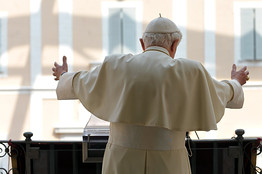By Stacy Meichtry
The Wall Street Journal
April 13, 2010
http://online.wsj.com/article/SB10001424052702303828304575179421838222464.html?mod=WSJ_hpp_MIDDLENexttoWhatsNewsSecond
[2001 document]
 |
| The guide is based on a 2001 overhaul of the Vatican's sexual-abuse laws that was spearheaded by Benedict XVI, who at the time was Cardinal Joseph Ratzinger, head of the Vatican's Congregation of the Doctrine for the Faith. |
ROME—In a push to quell criticism of Pope Benedict XVI's handling of the sex-abuse crisis, the Vatican on Monday issued an "introductory guide" to clarify church rules that require bishops to investigate allegations of sexual abuse by priests, to comply with civil laws in reporting such allegations and to notify the Vatican of any findings.
The guide, which was posted on the Vatican's Web site on Monday, notes that local bishops are required to investigate "every allegation of sexual abuse of a minor by a cleric" and to report allegations that have "a semblance of truth" to the Vatican's main office for disciplining priests, the Congregation for the Doctrine of the Faith.
Nothing in the guide departs from previous Vatican policy or rules. It is rather an attempt by the Vatican to clarify how its rules are implemented and seeks to defuse criticism that the Vatican maintains a veil of secrecy over how it handles sex-abuse cases.
Much of the guide is based on canon law and the 2001 overhaul of the Vatican's sexual-abuse rules that was spearheaded by Benedict XVI when, as Cardinal Joseph Ratzinger, he was head of the Congregation for the Doctrine of the Faith. Although the 2001 procedures have been in the public domain for years, they were initially written for use by bishops and canon lawyers. The new document, the Vatican said, serves as an "introductory guide which may be helpful to lay persons and non-canonists."
Over the past month, critics have accused the Vatican of foot-dragging in handling decades-old cases of sexual abuse by priests. In some cases, the Vatican took years to defrock priests as cases wound their way through the church's appeals process. Vatican officials, however, say that the 2001 overhaul made church sexual-abuse trials faster.
During the preliminary stage of an investigation, bishops can impose "precautionary measures" to safeguard their diocese against sexually abusive priests, the guide states.
A draft version of the guide, reviewed by The Wall Street Journal, didn't spell out what kinds of precautionary measures bishops should take to protect children from abusive priests, nor did it explain whether bishops are expected to immediately report abuse allegations to civil authorities. But the version posted on the Vatican Web site Monday noted that a bishop can restrict "the activities of any priest in his dioceses."
"This is part of [a bishop's] ordinary authority, which he is encouraged to exercise to whatever extent is necessary to assure that children do not come to harm," the guide said. The Vatican guide also noted that bishops are "always" required to follow civil law in reporting sexual-abuse allegations to law-enforcement authorities.
Once a bishop reports an abuse case to the Congregation for the Doctrine of the Faith, the Vatican can instruct the bishop to prosecute the alleged abuser in a local church tribunal, according to the guide. In such cases, the Congregation for the Doctrine of the Faith serves as an appellate court before a potential defrocking is carried out.
The Congregation for the Doctrine of the Faith is also empowered to dispense with a church trial and refer a case directly to the pope for defrocking "in very grave cases where a civil criminal trial has found the cleric guilty of sexual abuse of minors or where the evidence is overwhelming," the guide says.
The Congregation for the Doctrine of the Faith can also bring cases directly to the pope when priests are "cognizant of their crimes" and request dismissal from the priesthood.If a priest admits to committing sexual abuse and agrees to "live a life of prayer and penance," the Congregation for the Doctrine of the Faith can authorize a local bishop to prohibit or restrict the priest's public ministry, the guide states.
The guide is unlikely to curb anger among some abuse victims who say the Vatican rules are toothless. Such victims have called on the Vatican to crack down on bishops and cardinals who have failed to report sexual abuse to civil authorities.
"Church policies, whether online or not, are largely irrelevant," said Barbara Blaine, a member of the Survivors Network of those Abused by Priests. "Bishops answer to virtually no one and can easily ignore policies. We must focus on behavior, not policies, and on deeds, not words."
Write to Stacy Meichtry at stacy.meichtry@wsj.com
Any original material on these pages is copyright © BishopAccountability.org 2004. Reproduce freely with attribution.